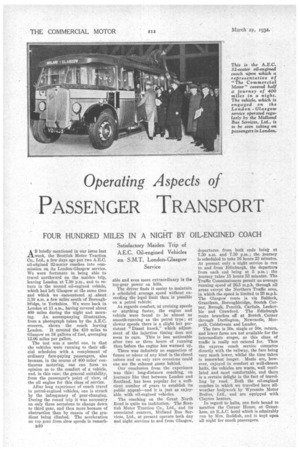Operating Aspects of
Page 58

If you've noticed an error in this article please click here to report it so we can fix it.
PASSENGER TRANSPORT
FOUR HUNDRED MILES IN A NIGHT BY OIL-ENGINED COACH
AS briefly mentioned in our issue last week, the Scottish Motor Traction Co., Ltd., a few days ago put two A.E.C. oil-eilgined 82-seater coaches into commission on its London-Glasgow service. We were fortunate in being able to travel northward on the maiden trip, leaving London at 7.30 p.m., and to return in the second oil-engined vehicle, which had left Glasgow at the same time and which we encountered ti,t .about 3.30 a.m.•a few miles south of Boroughbridge, in Yorkshire. We were back in London at 11 a.m., having covered about 400 miles during the night and morning. An accompanying illustration, from a photograph taken by the A.E.C. concern, shows the coach leaving London. It covered the 410 miles to Glasgow on 34 gallons of fuel, averaging 12.06 miles per gallon.
The test was a useful one, in that the vehicles were running to their official schedules with a complement of ordinary fare-paying passengers, also because, in the course of 400 miles' continuous motoring, one can form an opinion as to the comfort of a vehicle, and, in this case, the general suitability, from the passenger's point of view, of the oil engine for this class of service.
After long experience of coach travel in petrol-engined vehicles, one is struck by the infrequency of gear-changing. During the round trip it was necessary on only three occasions to change down to third gear, and then more because of obstruction than by reason of the gradient being climbed. The acceleration on top gear from slow speeds is remark B40
able and even more extraordinary is the top-gear power on hills.
The driver finds it easier to maintain a scheduled , average speed without exceeding the legal limit than is possible on a petrol yehicle: As regards comfort, at cruising speeds Or anything faster, the engine and vehicle were found to be almost as smooth-running as the petrol type ; at slower speeds there is a slight but persistent "Diesel knock," which adjust'neat of the injection timing does not seem to cure. This is less noticeable after two or three hours of running than before the engine has warmed up.
There was definitely no suggestion of fumes or odour of any kind in the closed saloon and on only rare occasions could one see the exhaust gases behind.
Our conclusion from the experience was this : long-distance coaching, on journeys like that between London and Scotland, has been popular for a sufficient number of years to establish its public appeal—and it is just as enjoyable with oil-engined vehicles.
The coaching on the Great North Road is quite an institution. The Scottish Motor Traction Co., Ltd., and its associated concern, Midland Bus Services, Ltd., at present operate both day and night services to and from Glasgow,
departures from both ends being at 7.30 a.m. and 7.30 p.m.; the journey is scheduled to take 16 hours 23 minutes. At present only a night service is run to and from Edinburgh, the departure from each end being at 5 p.m. ; the journey takes 15 hours 53 minutes. The Traffic Commissioners permit an average running speed of 26.5 m.p.h. through all areas except the Northern Traffic area, in which the speed is limited to 25 m.p.h. The Glasgow route is via Baldock, Grantham, Boroughbridge, Scotch Corner, Brough, Penrith, Carlisle, Lockerbin and Crawford. The Edinburgh route branches off at Scotch , Corner through Darlington, Newcastle, Morpeth, Coldstreain and Lauder.
The fare is 30s. single or 50s. return, and lower fares are not available for the intermediate stages, as this class of traffic is really not catered for. Thus the express coach service competes directly with the railway, the fare being very much lower, whilst the time taken is somewhat longer. Meals are, however, enjoyed in comfort at well-chosen halts, the vehicles are warm, well ventilated and most comfortable, and there is a certain delight in the fact of travelling by road. Both the oil-engined coaches in which we travelled have allweather bodywork by Wycombe Motor Bodies, Ltd., and are equipped with Clayton heaters.
In regard to halts, one feels bound to mention the Corner House, at Grantham, an R.A.C. hotel which is admirably run by Mrs. Reddish, and is kept open all night for coach passengers.




































































































